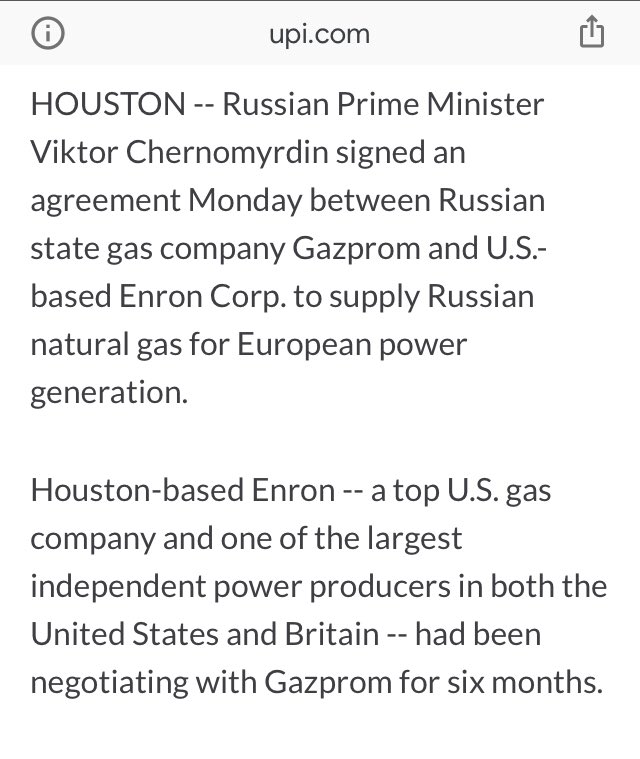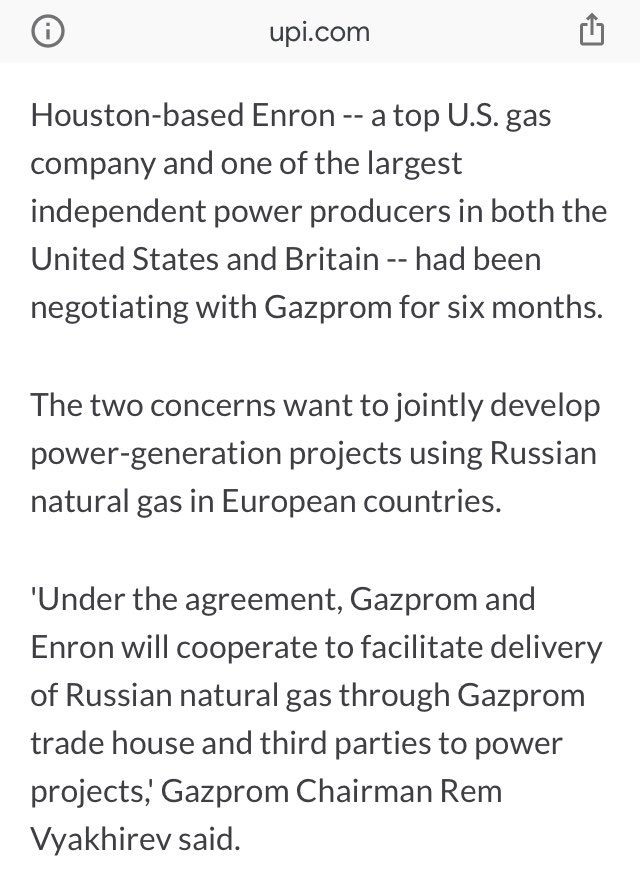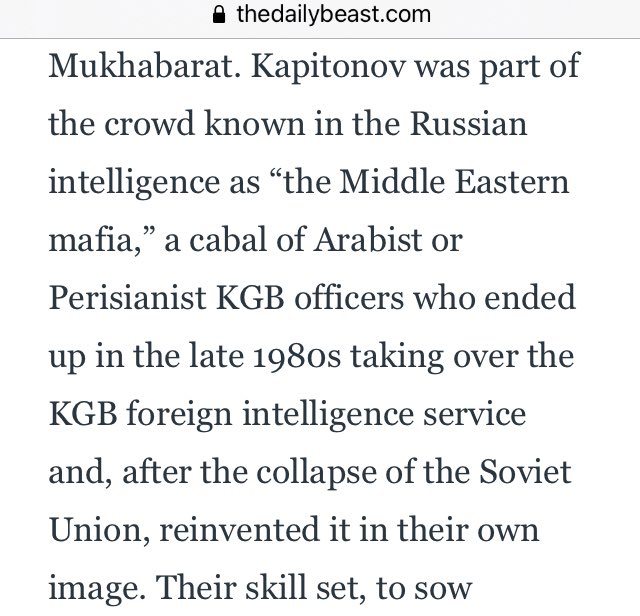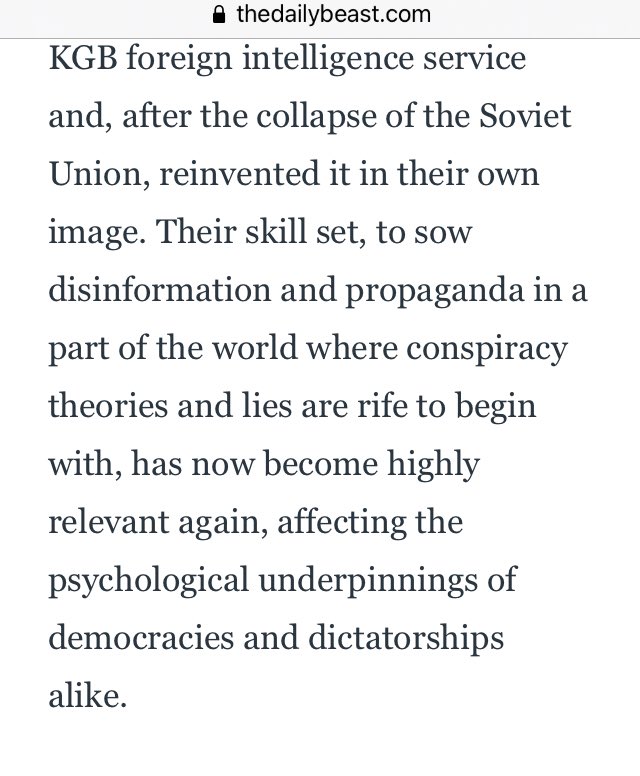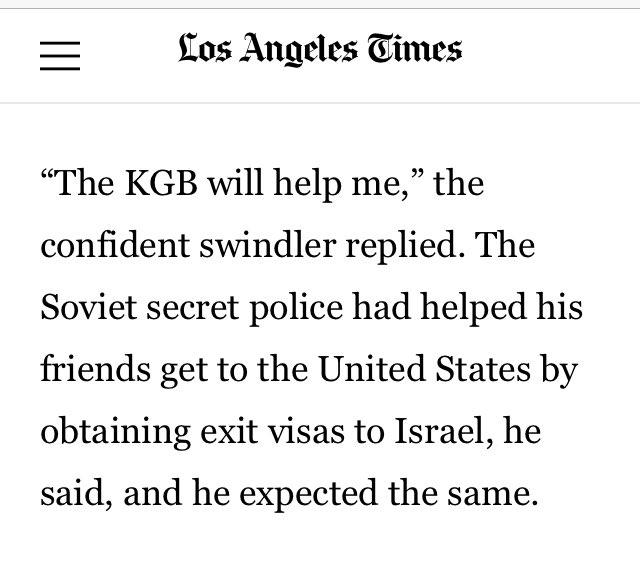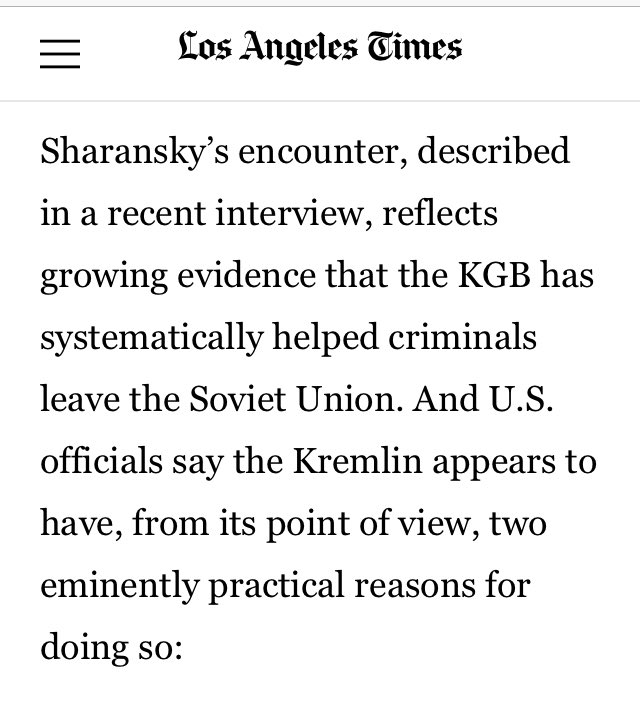
Wirecard client settled US charges of helping fraudsters
FTC alleged online payment provider Allied Wallet had role in scams and pyramid schemes
ft.com/content/71ed10…
FTC alleged online payment provider Allied Wallet had role in scams and pyramid schemes
ft.com/content/71ed10…
An online payment provider which last month settled US charges that it assisted fraudsters was a longstanding client of Wirecard, underlining concern about anti-money laundering procedures at the controversial German payments group. 
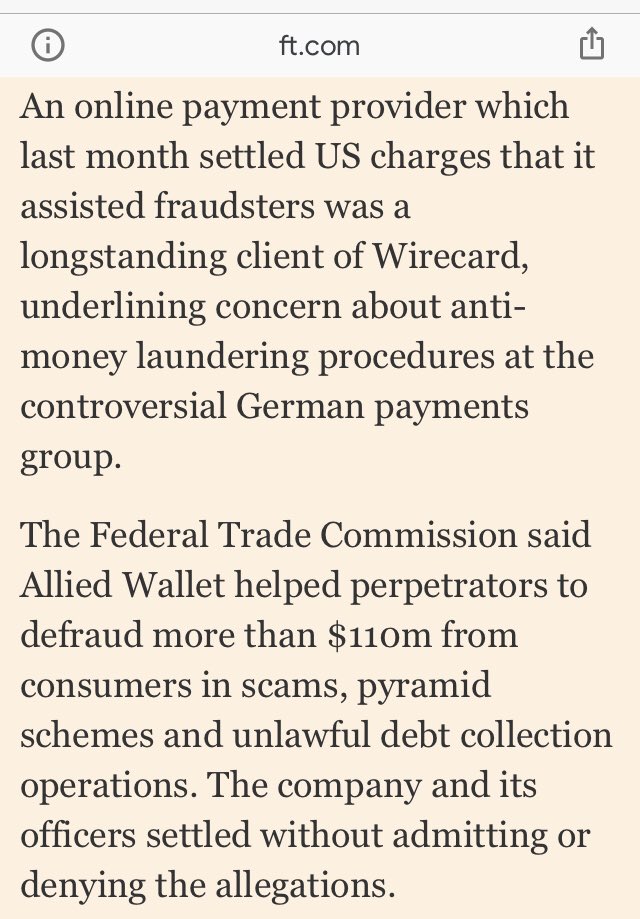
The Federal Trade Commission said Allied Wallet helped perpetrators to defraud more than $110m from consumers in scams, pyramid schemes and unlawful debt collection operations. The company and its officers settled without admitting or denying the allegations. 
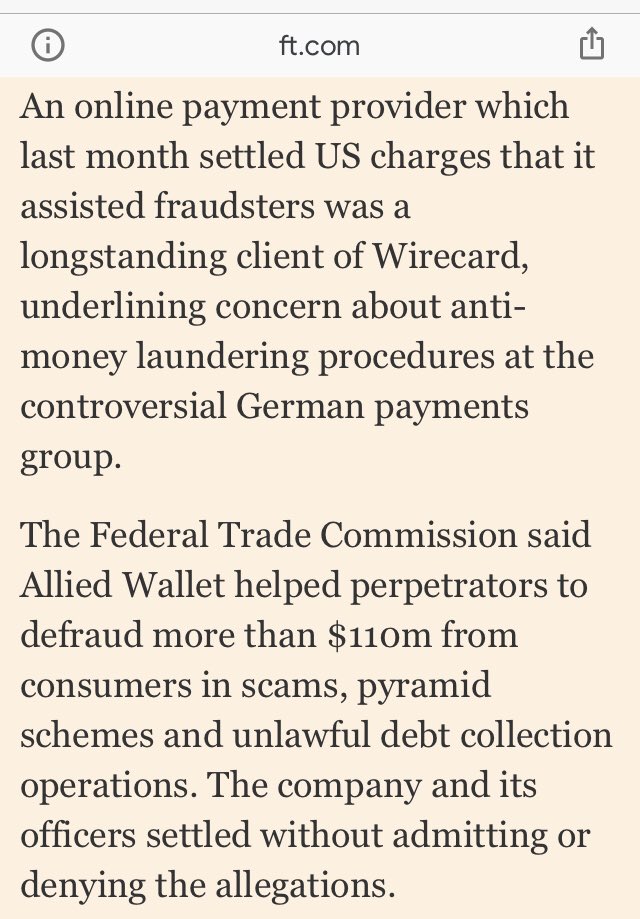
According to the FTC’s complaint, Allied Wallet knowingly processed payments for dubious merchants, and even helped create fake shell companies and dummy websites to hide fraud from banks and the credit card networks. 
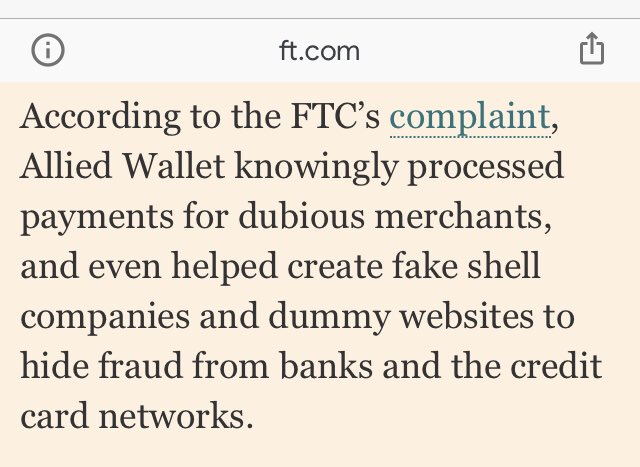
A phantom debt collector which threatened people over debts they did not owe, for instance, pretended to be a variety of merchants selling “blankets, housewares, paint supplies and hiking equipment”, the FTC alleged. 
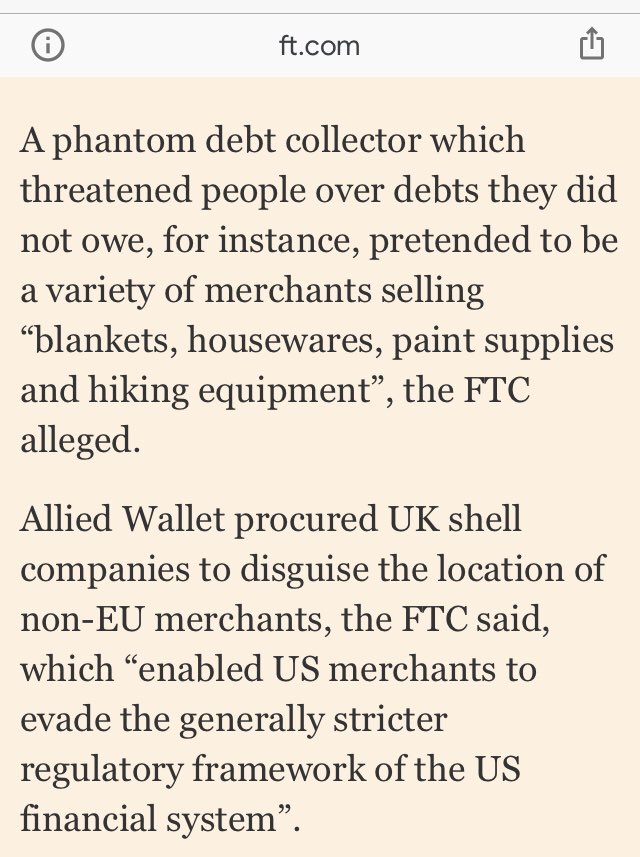
Allied Wallet procured UK shell companies to disguise the location of non-EU merchants, the FTC said, which “enabled US merchants to evade the generally stricter regulatory framework of the US financial system”. 
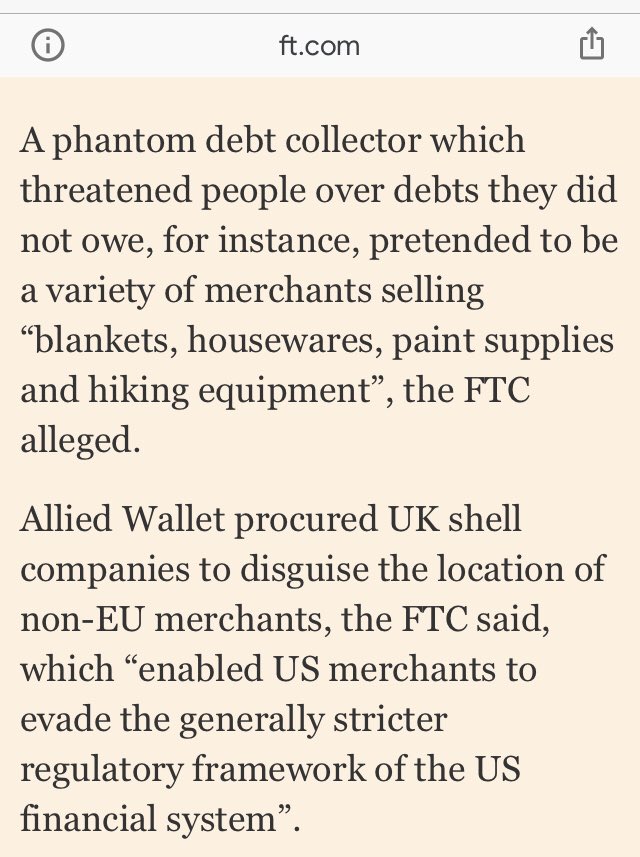
Allied Wallet facilitated payments for merchants and used Wirecard as one of its “acquirers”, the term for a financial institution that belongs to the big card networks, in a business relationship lasting from 2013 to 2018. 
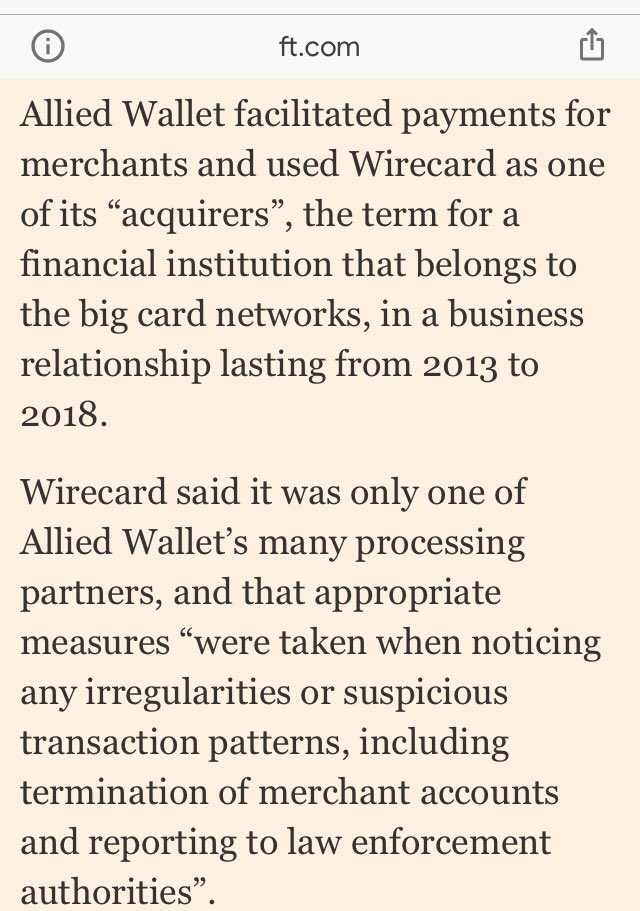
Wirecard said it was only one of Allied Wallet’s many processing partners, and that appropriate measures “were taken when noticing any irregularities or suspicious transaction patterns, including termination of merchant accounts and reporting to law enforcement authorities”. 
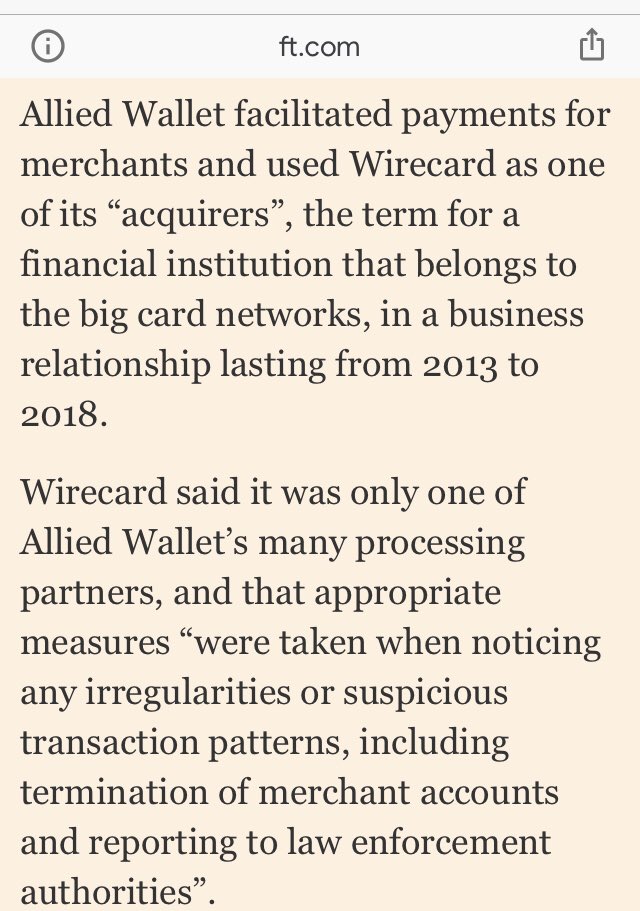
A technology upstart which grew into one of Germany’s largest financial institutions, Wirecard faces scrutiny over whether its internal controls have kept pace with its rapid expansion. 
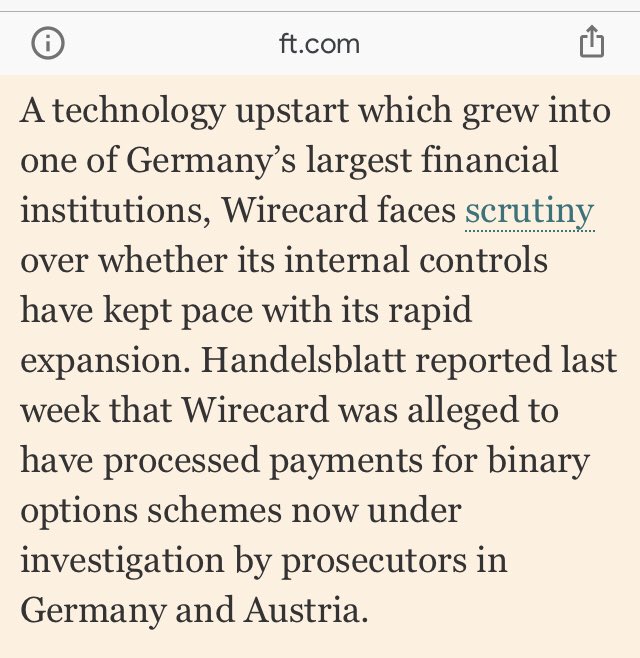
Handelsblatt reported last week that Wirecard was alleged to have processed payments for binary options schemes now under investigation by prosecutors in Germany and Austria. 
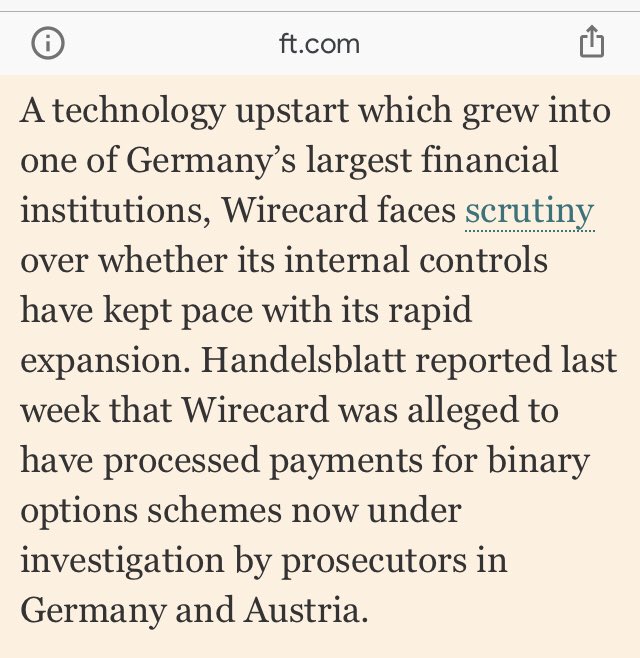
The German newspaper named Option888, a binary options scheme under investigation, as a Wirecard customer. The Financial Times has reported that Banc de Binary, which closed in 2017 following action from US regulators, was also a Wirecard client. 
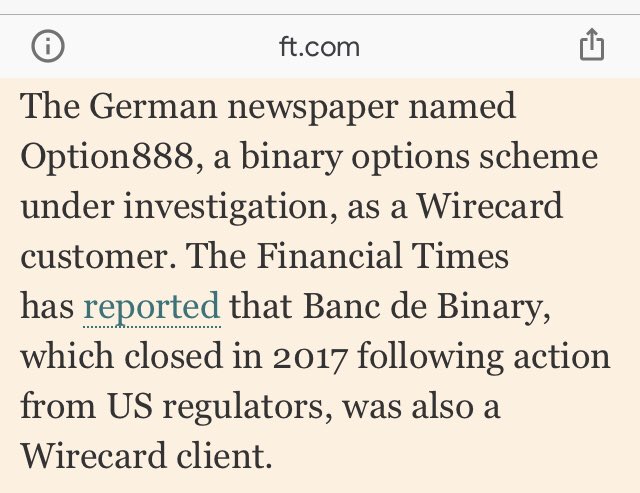
The FTC alleged that the US and UK operations of Allied Wallet had processed fraudulent payments since at least 2012. 
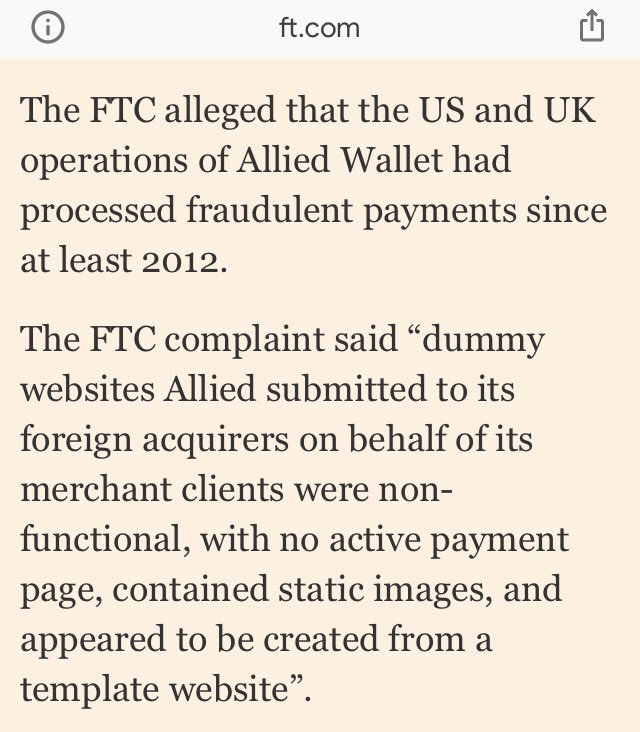
The FTC complaint said “dummy websites Allied submitted to its foreign acquirers on behalf of its merchant clients were non-functional, with no active payment page, contained static images, and appeared to be created from a template website”. 
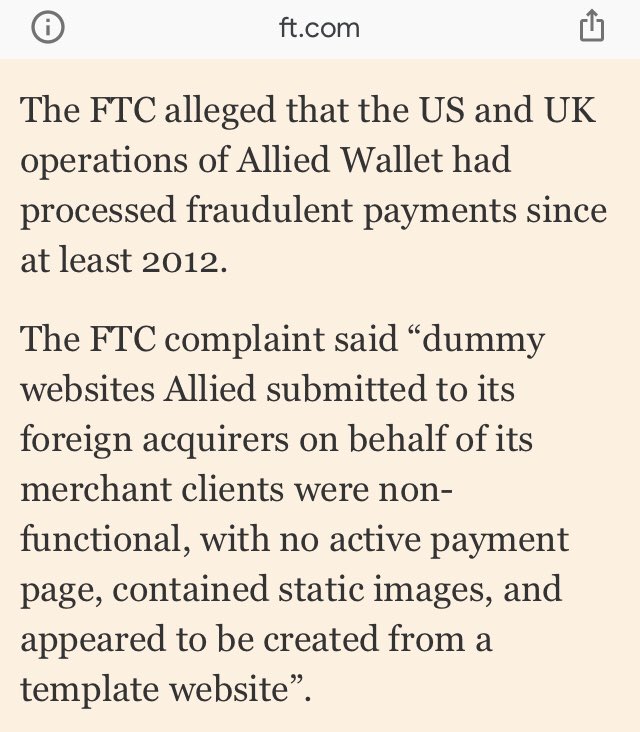
In addition to its direct relationship with Allied Wallet, documents seen by the FT show that Wirecard also recorded commission payments for transactions processed for Allied by Al Alam Solutions in Dubai. 
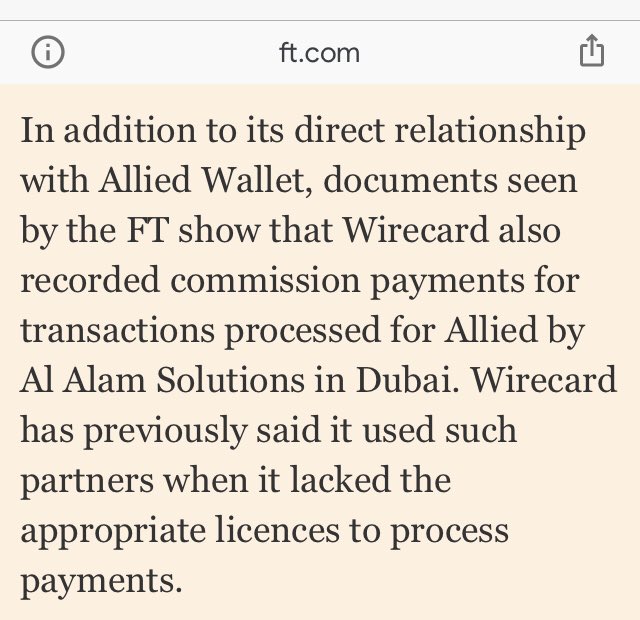
Wirecard has previously said it used such partners when it lacked the appropriate licences to process payments. 
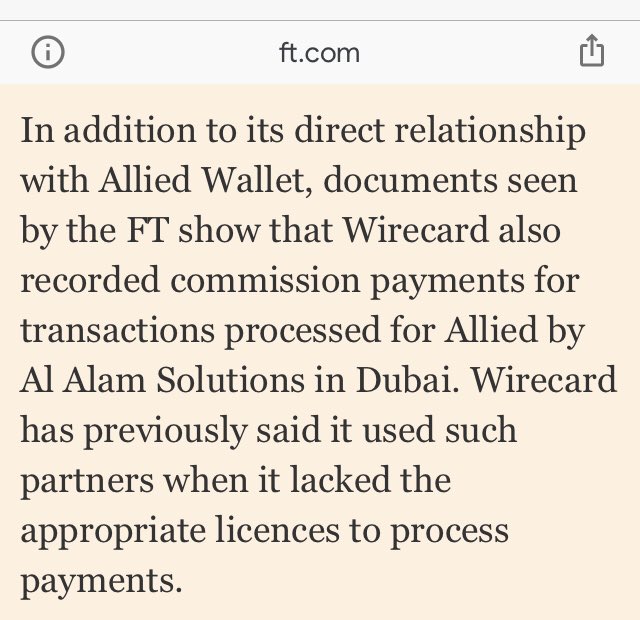
In the first three months of 2017, Wirecard’s Irish subsidiary attributed €1.3m of sales to Allied Wallet, on $31m (€30m) of transactions processed by Al Alam on behalf of Wirecard… 
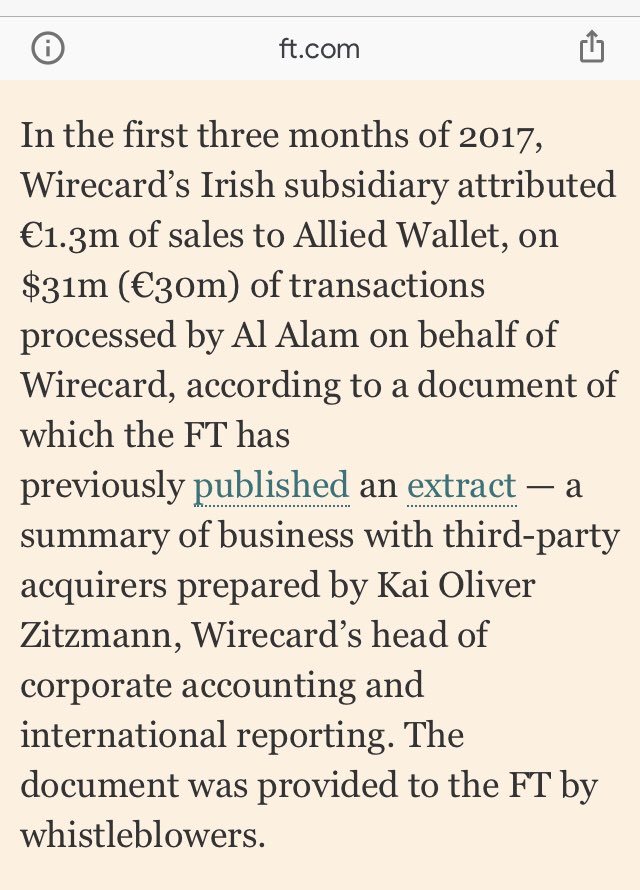
…according to a document of which the FT has previously published an extract — a summary of business with third-party acquirers prepared by Kai Oliver Zitzmann, Wirecard’s head of corporate accounting and international reporting. 

Under the terms of the settlement with the FTC, Allied Wallet is prohibited from processing payments for certain types of merchant and subject to stringent screening and monitoring requirements on payment processing. 
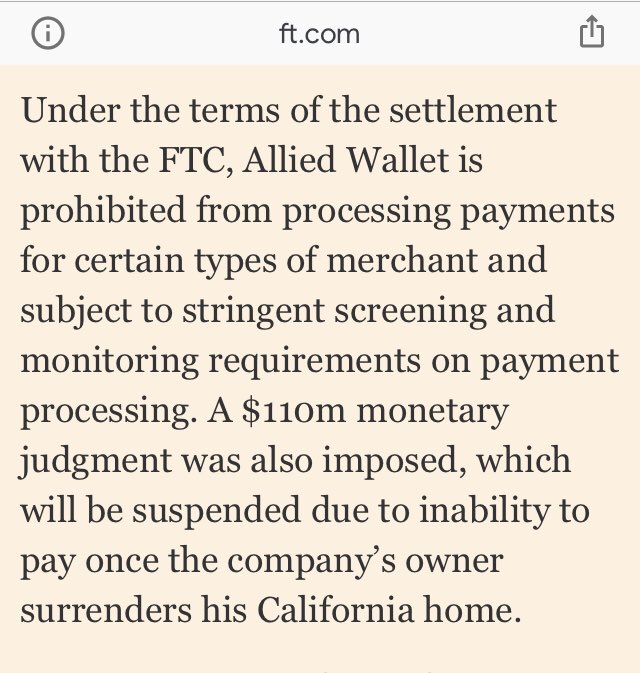
A $110m monetary judgment was also imposed, which will be suspended due to inability to pay once the company’s owner surrenders his California home. 
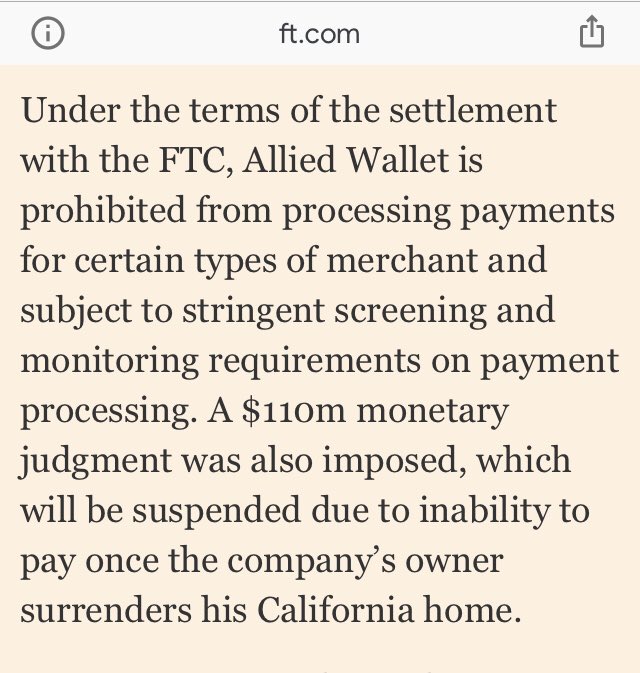
Forgot to state at the beginning that this is obviously an old article from June 2019 (which should be apparent, given the current status of both Wirecard and Allied Wallet). 

Most of you probably know by now that Wirecard collapsed spectacularly in June of 2020 and was exposed as a giant fraud.
https://twitter.com/financialtimes/status/1407956722342313989
Their CEO Marcus Braun was found dead in The Philippines.
https://twitter.com/stringwallapp/status/1404893684722810885
And their COO Jan Marsalek is hiding out in Russia under the protection of Russian intelligence services.
https://twitter.com/stringwallapp/status/1399108376244727811
Reportedly at an FSB training center.
https://twitter.com/mopeng/status/1406749219562541056
Marsalek had previously bragged about knowing the recipe for Novichok and having connections to Russian intelligence.
https://twitter.com/FinancialTimes/status/1281265595632291840
Meanwhile, the CEO of Allied Wallet, Andy Khawaja, was arrested in Sept 2020 on charges of funneling foreign money into political campaigns.
abcnews.go.com/International/…
abcnews.go.com/International/…
He had previously alleged that he had shown George Nader and officials of the UAE govt how to launder money into political campaigns using bogus prepaid gift cards and fake donor information.
https://twitter.com/stringwallapp/status/1388896588249059340
This donation laundering idea is likely what was going on with those suspicious data transfers between Trump Tower, Alfa Bank, Spectrum Health, and Heartland Payment Systems back in 2016.
https://twitter.com/stringwallapp/status/1388558718279770116
Turkish bank Aktif Bank is suspected of carrying out money laundering on a grand scale for a customer network that includes Wirecard.
https://twitter.com/karolcummins/status/1399101072833060864
Which is interesting, because the owner of Aktif Bank, Ahmet Calik, is the Turkish ambassador to the US based culture heritage organization called the Nowruz Commission.
https://twitter.com/StringwallApp/status/1399088301991071744
Nowruz Commission was founded by these 3 guys: A Russian educated diplomat from Kazakhstan, Mike Flynn’s twice-indicted former business partner, and a businessman from Minnesota named Nasser Kazeminy.
https://twitter.com/stringwallapp/status/1398902886332051456
Kazeminy has several relationships with Mike Flynn, Louis Freeh, James Woolsey, and Turkish and Russian businessmen with ties to Putin. This tree has many connected branches.
https://twitter.com/stringwallapp/status/1398923299493756928
Kazeminy is also related to a man named Thomas Schoenberger who married Kazeminy’s cousin.
https://twitter.com/stringwallapp/status/1419496563810918400
And they reportedly started a business together called Amadeus Investors LLC.
https://twitter.com/stringwallapp/status/1419497140217434112
And Schoenberger is alleged to be one of the original developers of the Qanon movement.
https://twitter.com/StringwallApp/status/1419484319920398346
Remember Bijan Kian, one of the three founders of Nowruz Commission? Well in a 2015 deposition, Schoenberger claimed to have worked with Kian on covert ops in Afghanistan.
https://twitter.com/StringwallApp/status/1419499891127095296
And at the very least, it seems like a remarkable coincidence that Flynn and Kazeminy have multiple intersecting relationships AND that Flynn is such a central figure in the Qanon movement.
https://twitter.com/stringwallapp/status/1419501206322417665
• • •
Missing some Tweet in this thread? You can try to
force a refresh


